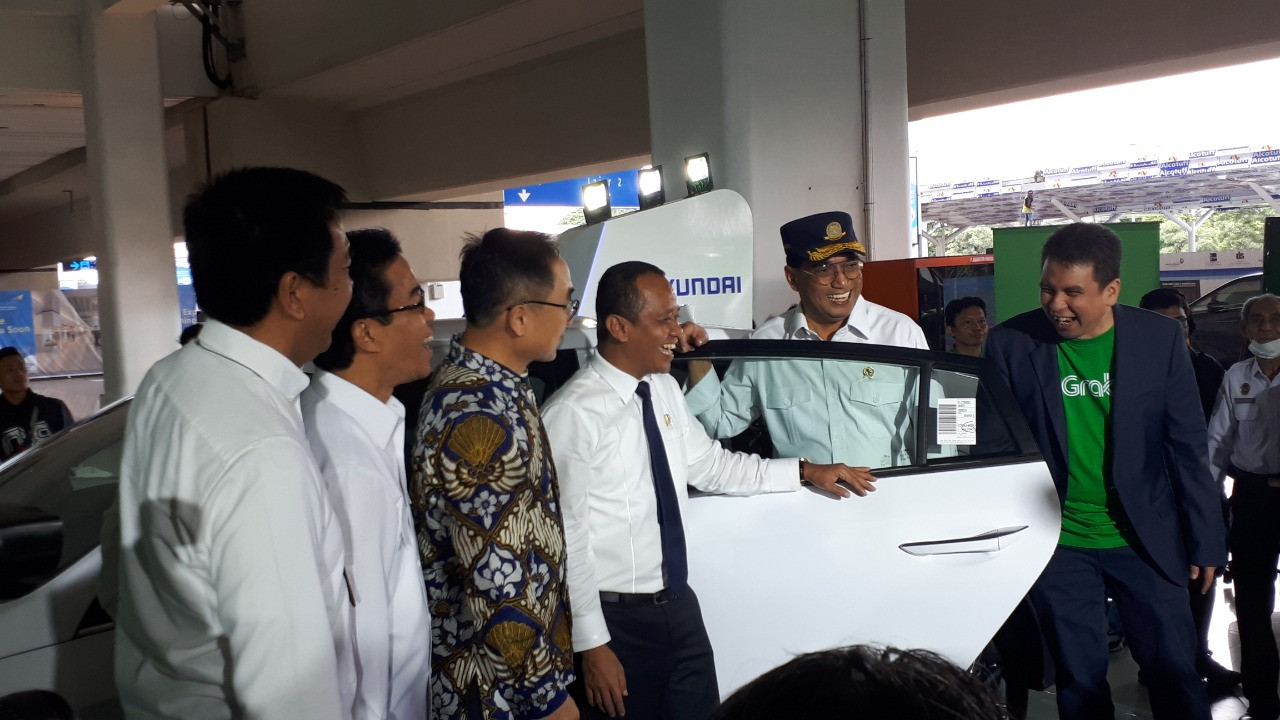Popular Reads
Top Results
Can't find what you're looking for?
View all search resultsPopular Reads
Top Results
Can't find what you're looking for?
View all search resultsGrab launches new airport e-taxi service at Soekarno-Hatta
Grab Indonesia has launched a new electric taxi service with an initial fleet of 20 Hyundai Ioniq Electric cars.
Change text size
Gift Premium Articles
to Anyone
 Grab Indonesia president director Ridzki Kramadibrata (right) shares a laugh with Transportation Minister Budi Karya Sumadi (second right) as the latter emerges from a Hyundai Ioniq Electric car at Soekarno-Hatta International Airport on Jan. 27, 2019. The minister was trying out the electric vehicle during the launch of the new GrabCar Elektrik e-taxi service on Monday. (JP/Eisya Eloksari)
Grab Indonesia president director Ridzki Kramadibrata (right) shares a laugh with Transportation Minister Budi Karya Sumadi (second right) as the latter emerges from a Hyundai Ioniq Electric car at Soekarno-Hatta International Airport on Jan. 27, 2019. The minister was trying out the electric vehicle during the launch of the new GrabCar Elektrik e-taxi service on Monday. (JP/Eisya Eloksari)
T
he capital can expect to see more electric vehicles (EVs) on its streets with the launch of GrabCar Elektrik, an electric taxi (e-taxi) service based out of Terminal 3, Soekarno-Hatta International Airport.
Ride-hailing services decacorn Grab Indonesia has partnered with South Korean automotive giant Hyundai to operate 20 Hyundai Ioniq Electric cars as part of a trial program under its new GrabCar Elektrik service.
“The [taxis] are available for booking starting today,” Grab Indonesia president director Ridzki Kramadibrata told the press at the launch event on Monday.
Users of GrabCar Elektrik would be charged 10 to 15 percent higher than the regular GrabCar service, said Ridzki. This meant that Grab's e-taxi passengers would be paying Rp 2,200 (16 US cents) to Rp 2,750 per kilometer instead of Rp 2,000-2,500 per kilometer.
Grab is the second company to offer electric transportation services in Indonesia after public taxi company Blue Bird, amid the government's efforts to beef up the use of electric vehicles (EV) to reduce the country's reliance on fossil fuels.
Just last year, Blue Bird procured 30 e-taxis from Chinese automaker BYD to expand the fleet of its regular Blue Bird service, and procured four Tesla cars from the American EV manufacturer for its Silver Bird high-end taxi service.
“We decided to launch the pilot [program] at the airport because we can easily charge the vehicles [there]. And the airport offers diverse consumers, from domestic to international users,” Ridzki at the event on Monday, emphasizing that Grab's e-taxi service was in line with the government's green energy initiative.
Earlier on Dec. 13, 2019 during the launch of Grab Indonesia's EV Ecosystem Road Map, Ridzki announced that the EV trial program would be financed by a Rp 27 trillion ($2 billion) investment from Japanese conglomerate SoftBank.
He added on the same occasion that the company planned to deploy a fleet of 500 electric cars by the end of 2020. The majority would be Hyundai models, but he said that Grab remained open to offers from other automakers.
Ridzki said that the expansion plan also depended on provisions and facilities in the business support ecosystem, such as tax incentives and charging stations.
To date, Jakarta has only three EV charging stations: at the South Jakarta headquarters of state electricity company PLN, at the company’s central distribution unit in Central Jakarta, and at the Senayan City shopping mall in South Jakarta.
Presidential Regulation No. 55/2019 on accelerating the use of EVs in the country also covers general provisions related to EVs, including battery production, domestically manufactured components, charging stations and tax incentives, but still needs supporting regulations from the relevant state agencies.
“I believe we are on the right track, since we already have the Presidential Regulation. What we need now are the derivative regulations,” Transportation Minister Budi Karya Sumadi said at the GrabCar Elektrik event.
He added that he had issued a ministerial regulation to lower the test fee for EV prototypes to Rp 25 million from Rp 50 million originally in support of the government policy.
Budi said that other incentives might include establishing special lanes and free parking for EVs, and that he had discussed issuing differently colored license plates for EVs with the National Police for easier identification.
"If more public transportation [companies] used EVs, it would become a lifestyle [choice], and more people would make the switch," said Budi. "In turn, once more people start buying EVs, they will become more affordable."
The government has targeted 2021-2022 for the automotive industry to start the mass production of EVs, and a 2025 production target of 400,000 electric cars and 200,000 electric motorcycles.









